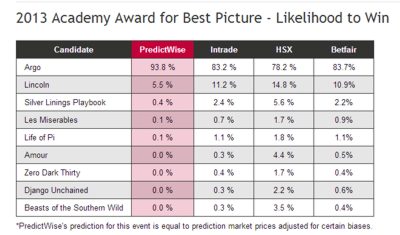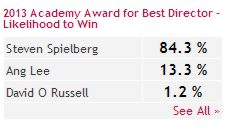| Computer Science Of Prediction - Who Will Win The Oscars |
| Written by Janet Swift | |||
| Wednesday, 20 February 2013 | |||
|
David Rothschild of Microsoft Research New York City, who has been working on harnessing the value of big data, has turned his attention to the 2013 Academy Awards using the wisdom of crowds. Last year Rothschild used a data-driven model to predict the results of the U.S. presidential election and was correct in 50 of the 51 jurisdictions. Now he has produced predictions for all 24 categories of the Academy of Motion Picture Arts and Scientists' 85th annual Academy Awards - the Oscars. You can view the predictions on PredictWise, a site maintained by David Rothschild and Andrew Leonard that aggregates, analyzes, and creates predictions on politics, sports, finance, and entertainment. The same real time data are also used in an Excel App that is available for free download.
Rothschild's predictions are in line with those of other pundits - but his tend to be more extreme: (click in table to enlarge)
So how are these predictions arrived at? The answer lies in a methodology that enables the researchers to: quickly and repeatedly aggregate the expectations of individuals to create predictions that have been empirically proven to be more accurate than traditional polling methods or available prediction markets. The PredictWise site has been collecting data to address a particular problem with the Oscars, namely how do the categories interact. As Rothschild writes on his blog: If Lincoln wins the Oscar for Best Adapted Screenplay, does that make Lincoln's likelihood of winning Best Picture increase, decrease, or is there no correlation? He goes on to explain that a positive correlation means that a movie that wins earlier categories would win later ones, giving multiple awards to whichever film wins Best Picture, on the other hand a negative correlation is where voters want to split their votes between different categories so that movies that win earlier categories are less likely to win later ones. For example, in the most extreme situation, assume voters like Argo and Lincoln and want them both to have victories. Any voter that votes for Argo (Lincoln) for Best Adapted Screenplay will vote for Lincoln (Argo) for Best Picture. Thus, if Argo (Lincoln) wins Best Adapted Screenplay it becomes extremely likely the other will win Best Picture.
This makes the task of predicting all 24 of the Oscar categories a difficult one, Rothschild contrasts the situation with the Presidential Election where he had almost 100% accuracy: In politics we assume massively high positive correlation, especially as the campaign enters the final months. National trends move states upwards or downwards as a pack, rather than the states shifting independently shifting between candidates. But, the answer is not as clear for the Oscars, where I do not have the historical data to answer this question with any significance To gain more data there is a game on PredictWise where visitors can vote on the Oscar outcomes and at the same time provide data that is valuable for improving the predictive capability of the PredictWise model.
More InformationPredictWise 2013 Academy Awards Related ArticlesMicrosoft's New Research Center into Social Data Google Flu Prediction - Beware The Media Effect Twitter Can't Predict Elections Either Social Networks, Suicide and Statistics
To be informed about new articles on I Programmer, install the I Programmer Toolbar, subscribe to the RSS feed, follow us on, Twitter, Facebook, Google+ or Linkedin, or sign up for our weekly newsletter.
Comments
or email your comment to: comments@i-programmer.info
|
|||
| Last Updated ( Wednesday, 20 February 2013 ) |




